
Credit: Will Kirk / Johns Hopkins University
Beautify the broken
Zero-waste workshop demonstrates how to use bits of discarded or broken glass to create works of art
By Hub staff report
/ Published May 9, 2022- Name
- Johns Hopkins Media Relations
- jhunews@jhu.edu
- Office phone
- 443-997-9009
The Johns Hopkins Ecological Design Collective hosted an art workshop Thursday that taught participants how to take discarded or broken glass and transform it into works of art. Led by youth-owned Baltimore Broken Glass, the workshop aimed to impart values of waste reduction, conservation, and sustainability.
The Ecological Design Collective is an interdisciplinary community of scholars, students, and community members dedicated to bringing new ideas and solutions to issues of social, economic, and environmental justice. For the past year, the collective has been collaborating with the South Baltimore Community Land Trust on a zero-waste campaign for Baltimore advocating for the development of alternative waste infrastructure in South Baltimore. The students in the collective partnered with students at other local institutions to form a Post-Landfill Action Network chapter with the goal of influencing the Johns Hopkins Sustainability Plan and promoting better food waste practices on the university's campuses.
"Most problems can't be solved using a single tool; the Ecological Design Collective has connected a number of passionate individuals from a wide array of backgrounds, all motivated by our need to be better stewards of our planet," says Aimee Bourey, a graduate student who helped organize the workshop. "This event brought students from high school through their post-doctoral studies, from different schools and disciplines, together to reclaim what the city had designated as waste and make art."
Ryan Aghamohammadi, a senior majoring in the Writing Seminars and anthropology, says they hope the workshop, like other programs of the Ecological Design Collective, inspires students to get involved in local waste reduction efforts and to recognize the impact of waste on the planet. "Our waste doesn't disappear; it has immense effects on our environment and our communities, especially communities of color and low-income communities who have historically bore the brunt of waste," Aghamohammadi says. "We all have a part to play in actualizing a new future, one where we ethically and sustainably deal with waste, one where we work hand-in-hand with our communities, and one where no community must deal with the consequences of another's waste. Now is the time to act for a greener, equitable, sustainable future for all of us."







